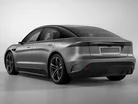10 technology firms venturing into the EV market

For various reasons, technology firms have a lot to offer the EV industry, whether that means developing all new vehicles or automating those that are already on the road. As industry players make plans to come away from fossil fuels, these 10 technology companies are coming at it with fresh eyes.
10. Sony
Consumers will most likely know Sony for its presence in the digital product space. The company is well positioned in both the consumer goods and professional equipment space with offerings from smartphones and smart televisions to digital cameras—and soon, digital vehicles.
The company has already showcased its exciting vehicle prototypes, which not only represent a new area of innovation for the brand through its business, Sony Mobility Inc., but also uses the company’s latest technologies, such as Sony Semiconductor’s self-driving sensor.
9. Apple
While nobody knows yet what Project Titan will look like, there are no doubts that Apple will attempt to take the market by storm. The leading tech giant is already mastering the art of rapid prototyping and go-to-market strategy, but consumers, businesses and technology enthusiasts await more news on its latest endeavours.
There are various conceptual designs of the ‘Apple Car’ across the internet, but these remain speculative, but we do know that Apple has been in talks with the EV startup, Canoo.
8. Alibaba Group
Operating under a joint venture business, International Motors (IM) Group, Alibaba Group is developing solutions to cater for one of the largest countries to adopt EVS—China.
The e-commerce corporation is working in partnership with SAIC Motors and Zhangjiang Hi-Tech to launch its own line of electrified vehicles into the Chinese automotive market. IM Group has already showcased two cars that are ready for the production line, the Zhiji IM L7 luxury sedan being one of them.
7. Xiaomi
As a leading smartphone manufacturer—the third largest in the world, Xiaomi invested US$1.5bn in the startup Xiaomi EV, which is based in Beijing. The company is up there in the smartphone industry with Apple and Samsung as its main competitors, but the company name is used sparsely in the US.
The company has plans to launch its first vehicle production line in 2024, with its factory expected to produce 300,000 cars per annum.
6. Foxconn
Another Asian participant in the Top 10, Foxconn is also edging its way into the EV industry, sporting cars like the Model C, Model E, and the Model T bus.
A competent business in the manufacturing space, Foxconn is known for building iphones for Apple as well as other consumer electronics on the market. The Taiwanese company will continue to support its clients through its manufacturing procedures, but is also developing the aforementioned models as products for its ‘Foxtron’ brand.
5. Baidu
A prominent developer of self-driving technology, Baidu is partnering with the leading automotive group, Geely, in a joint venture called Jidu. In 2021, Baidu decided to take the leap into automotive production, expanding its horizons as a software developer.
The search-engine company invested much of its effort into the self-driving space with the first implementation of its technology in the Apollo Go.
4. Waymo
Google’s self-driving car project called Waymo spans small vehicles, but is also developing applications for trucking. The company is centred around autonomous driving and in the process creating a vehicle that will be solely used for this purpose.
The car is called the Zeekr and prioritises space and comfort for passengers as it alleviates the need for steering components inside the vehicle.
3. Oppo
Another Chinese smartphone maker is moving into the automotive sector. Oppo has proposed plans to enter the highly competitive industry with a vehicle that is designed to meet mobility demands in India.
The car will resemble the cheapest cars on the market, which is sold by Tata Motors in India—the Tata Nano— and is set to make its debut in 2024, providing the company’s launch goes to plan. The company must determine whether it ventures alone or acquires expertise from an automotive manufacturer.
2. Huawei
Showing that cars present similar features to smartphones, another company from the digital device industry pulls up. Huawei is working on its own automotive brand with Seres, and has already designed the prototype of the SF5 model.
A further partnership with Huawei will result in a hybrid crossover, the Aito M5, which leverages Huawei’s DriveOne three electric system and is expected to be one of the Tesla Model Y’s main competitors on the Chinese market.
1. Didi
The company is set up for success thanks to backing Warren Buffet and the esteemed EV manufacturer, BYD. Didi’s vehicles will be purpose-built for ride hailing and leveraging the expertise of its investors to bring the D1 hatchback model to market as its first vehicle. The company has also made plans to develop an EV for the consumer market as market production dates are set for the second half of 2023.


